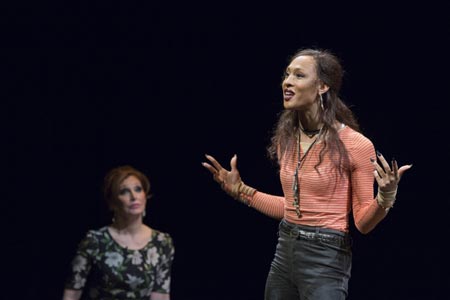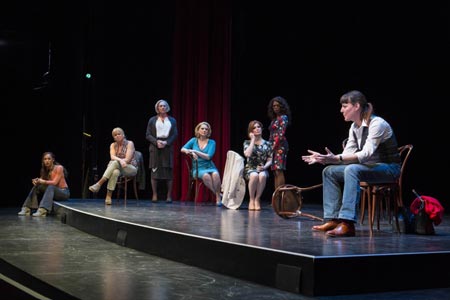Play
Written by Paul Lucas
Directed by Jo Bonney
American Repertory Theater
Loeb Drama Center
Harvard University, Cambridge, MA
January 19 – February 5, 2017
With Marlo Bernier (Josephine), Matthew Hancock (Zakia), Eden Lane (Sandra), Bianca Leigh (Tatiana), M. J. Rodriquez (Luna), Rebecca Root (Eden), Jack Wetherall (Dr. Violet)

MJ Rodriguez as Luna
in “Trans Scripts, Part I: The Women”
Photo: Gretjen Helene Photography
Courtesy of American Repertory Theater
To create this ingeniously compiled piece, playwright Paul Lucas interviewed a series of transgender women, edited their responses and interleaved them in a form that is dramatic and revelatory. Seven actors embody the trans women in question, and convey wonderfully and remarkably the wide range of experiences and orientations that lead to alternative gender identification.
The accounts are by turn invariably poignant and also frequently funny.
One of the characters talks about how, in the workplace, as a woman, she is newly ignored and dismissed in ways that men are not. But, as she wryly notes, “while discriminating against me they’re validating who I am, so I’m okay with that…” It’s an hilarious response, full of Catch-22 psychology and a true validation of the sometimes bizarre stances that change of gender identity imposes.
Another character pragmatically reflects on the sexual accommodations required by gender change. “You meet someone, you fall in love and you make the best out of the available equipment, and if need be, you go out and buy stuff.” Again, this is very funny, very real and very down to earth.
There are other purely moving moments, such as when a grandparent calls to congratulate his granddaughter on her sex change operation and says to friends “this is my granddaughter and I’m so proud!”

“Trans Scripts, Part I: The Women”
Photo: Gretjen Helene Photography
Courtesy of American Repertory Theater
A Jewish character talks with irony and lots of laughs about how, with her family, the question of gender change begins to take on less signficance than her having a Christmas tree or eating bacon.
Another character proudly tells of a surprisingly decent tabloid newspaper reporter who comes to interview her on gender change and instead of writing a lurid expose prints a full four page verbatim interview that honestly reveals the perspectives of the subject.
Purely uplifting expressions include a character’s avowal that “when you see your own courage working and overcoming prejudice and abuse it’s a great thing.”
The piece ends with the characters, who have mostly been sitting in a row of chairs, coming together at the center of the stage. As the last lines are said, names of the characters who have spoken, and of the many characters whose voices contribute to what they have said, are mentioned, creating a musical representation of the widespread nature of the phenomenon, confirming the diversity of the population that now comprises the trans world.
Simply but effectively staged, the play employs subtle movements by each character to focus each story, the effect clear and dramatic.
This piece calls to mind the technique pioneered by Anna Deavere Smith at the ART in 1991 with her signal work Fires In The Mirror: Crown Heights, Brooklyn and Other Identities. In that piece, Smith adapted verbatim interviews with Orhtodox Jews and African-Americans from the Crown Heights neighborhood of Brooklyn who had been affected by racial tensions.
Trans Scripts, artfully named, uses a related technique vis a vis the transgender experience. Dividing its dramatic burden among seven actors immediately delivers the penetrating and persuasive message that the trans experience is highly diverse and enriched by that diversity.
The wide range of perspectives presented, and the variety of experiences and outlooks expressed, clearly signals that no single account of transgender choice can represent all, that the variety of avenues to that choice is rich, complex. and brimming with vitality.
– BADMan
Leave a Reply